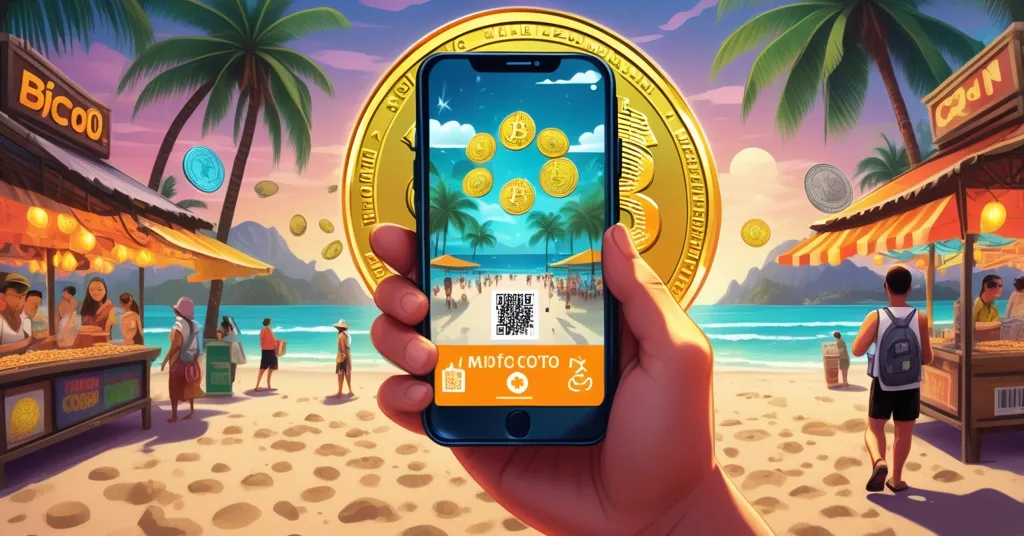Thailand’s Crypto Sandbox: Pay with Bitcoin, Spend Baht as a Tourist Nationwide

Thailand Crypto Sandbox: Pay with Bitcoin, Spend Baht as a Tourist
Picture yourself on a sun-drenched Thai beach, coconut in hand, settling the bill with Bitcoin converted to baht through a quick QR scan. Thailand has rolled out a daring “crypto sandbox” initiative, led by the Securities and Exchange Commission (SEC) and the Bank of Thailand (BOT), letting foreign tourists turn their digital assets into local currency for seamless spending nationwide. This isn’t just a tech gimmick—it’s a calculated move to supercharge tourism revenue and stake Thailand’s claim as a fintech powerhouse. But with heavy regulations and local pushback, is this a groundbreaking step or a sandbox built on shaky ground?
- Innovative Experiment: Tourists can convert cryptocurrencies like Bitcoin to baht via licensed platforms for spending in Thailand.
- Economic Play: Aimed at boosting tourism and establishing Thailand as a regional fintech leader.
- Tight Controls: Strict KYC/AML rules, spending limits, and a ban on direct crypto payments raise both safety and centralization concerns.
- Mixed Feedback: While promising, local tourism sectors criticize poor education and monitoring risks.
Phuket Pilot: Early Wins and Lingering Woes
The crypto sandbox kicked off with a trial run in Phuket, a tourist magnet known for its beaches and bustling markets. After garnering enough positive traction, the program expanded across Thailand, signaling early success. Yet, the devil’s in the details—or rather, the lack thereof. Specific data on participation numbers or total conversion volumes from the pilot remains scarce, which is a red flag for transparency. If the SEC and BOT want trust, they need to show their cards.
Local stakeholders in Phuket aren’t exactly throwing a parade either. Bhummikitti Ruktaengam, Vice President of Tourism Strategy at the Tourism Council of Thailand, didn’t mince words about the rollout’s flaws. There’s a glaring communication gap—many tourism operators were caught off guard, unaware of the sandbox’s existence, let alone how to integrate it. Add to that worries about money laundering, especially with illegal foreign businesses already a thorn in Phuket’s side, and you’ve got a recipe for skepticism. Without proper education and airtight monitoring, this experiment risks becoming a playground for bad actors, as highlighted in feedback from Phuket’s tourism sector.
How It Works: From Bitcoin to Baht in Three Steps
For the uninitiated, let’s break down how this crypto-to-baht magic happens. It’s not as simple as waving your Bitcoin wallet at a street vendor—Thailand’s got guardrails galore. Here’s the process, step by step, with further details available through explanations on how the sandbox operates for tourists:
- Verify Identity: Tourists must pass strict Know Your Customer (KYC) checks on a licensed exchange or platform. Think of it as showing your passport before boarding a flight—non-negotiable.
- Convert Crypto: Swap your digital assets like Bitcoin or Ethereum for Thai baht through these regulated middlemen. No direct crypto payments allowed; it’s fiat or bust.
- Spend via Digital Wallet: The converted baht loads into a digital wallet, letting you pay for goods and services with a quick QR code scan, just like using a mobile payment app back home.
For clarity, KYC and Anti-Money Laundering (AML) rules are standard in finance to prevent fraud and illicit transactions. They’re a pain, sure, but necessary in a space where scams have fleeced countless investors. Digital wallets and QR codes, meanwhile, are tech most of us already know—think scanning to pay for coffee, except the funds might trace back to your crypto stash. So far, Bitcoin and Ethereum are confirmed as supported assets, but the full list of eligible cryptocurrencies is murkier than a Bangkok monsoon. Regulators, care to enlighten us?
Tourism Boost and Fintech Ambitions
Thailand isn’t just playing tech pioneer for kicks. As a global tourism heavyweight, the country’s eyeing a serious economic lift post-pandemic. With Merkle Capital ranking Thailand as the fifth-largest crypto holder worldwide—and the biggest in Asia, per investment advisor Woramet Chanseng—this sandbox targets a niche but growing crowd of crypto-savvy travelers. The potential capital inflow could be a game-changer for local businesses still recovering from years of travel slumps, aligning with broader fintech initiatives to bolster tourism.
Beyond immediate revenue, there’s a bigger chess move at play. Forcing conversions to baht might juice demand for the local currency, strengthening its economic footing. It’s also a sneaky stepping stone toward a digital baht, a central bank digital currency (CBDC) Thailand’s been flirting with for years. And let’s not forget the bragging rights—positioning itself as a fintech hub could lure tech talent and investment, putting Thailand on the map alongside heavyweights like Singapore. As SEC Deputy Secretary-General Anek Yuyuen put it, this is about economic recovery and tourism growth, with careful risk management alongside the BOT.
Regulatory Tightrope: Innovation or Overreach?
Before you get too excited, let’s talk red tape. Thailand’s regulators aren’t taking chances after crypto’s infamous history of scams and crashes. Every tourist must jump through KYC and AML hoops, verifying their identity before a single satoshi turns to baht. Direct crypto payments? Forget it—everything channels through licensed operators and e-money platforms, ensuring the system stays under lock and key, as detailed in the SEC and BOT regulatory framework.
Spending limits add another layer of control. Tourists can spend up to ฿50,000 (about USD 1,375) monthly at local shops and markets, while certified businesses like fancy hotels or upscale restaurants get a cap of ฿500,000 (roughly USD 13,750). It’s a safeguard against abuse, but let’s be real—so no splurging your entire Bitcoin fortune on beachside cocktails. Thailand’s got limits, folks! Still, as Bitcoin maximalists, we can’t help but grimace. This setup tethers crypto to fiat and middlemen, spitting in the face of decentralization’s core promise. While safety matters, true financial freedom feels just out of reach in this tightly controlled sandbox.
The Dark Side of the Sandbox
Now, let’s call it what it is: not everything’s rosy. Phuket’s tourism sector has sounded alarms over glaring holes in this experiment. Beyond the education gap—where local vendors are left clueless—there’s a real fear of money laundering turning tourist hubs into cesspools of illicit cash. With illegal foreign businesses already dodging oversight in places like Phuket, shoddy monitoring could be a disaster waiting to happen. Bhummikitti Ruktaengam didn’t hold back, warning that the ecosystem isn’t ready and rules need tightening before things spiral.
Enforcement is another beast. How do you track transactions in chaotic markets or remote beach towns without killing the user experience? And those spending limits—while well-intentioned—might screw over smaller vendors. A ฿50,000 cap for local shops versus ฿500,000 for big players smells like an uneven playing field, potentially pushing tourists toward corporate giants over mom-and-pop stalls. Then there’s the scam risk. Tourists, beware: unlicensed operators promising quick conversions could drain your wallet faster than you can say “pad thai.” Stick to SEC-approved platforms, or you’re asking for trouble, especially when considering the complexities of converting Bitcoin payments to baht for tourism.
Global Context and Future Horizons
Zooming out, Thailand’s not alone in testing crypto waters. El Salvador went all-in with Bitcoin as legal tender, a bold but rocky gamble. Singapore’s regulatory sandboxes prioritize fintech innovation with ironclad oversight, while Dubai toys with blockchain for tourism logistics. Thailand’s middle-ground approach—blending innovation with caution—might just hit the sweet spot if they nail execution. Unlike El Salvador’s wild ride, this feels more pragmatic, less ideological, and has been shaped by recent policy updates from the Bank of Thailand.
Looking ahead, could altcoins or stablecoins play a bigger role? While Bitcoin and Ethereum dominate now, something like USDT could offer tourists less volatility for conversions—why isn’t Thailand exploring that niche? And if this sandbox pans out, it might inspire copycats in Greece or the Bahamas, merging digital assets with traditional economies under tight leashes. Nirun Fuwattananukul, CEO of Gulf Binance, called this a significant leap, evolving from mere ideas to a structured framework for nationwide adoption. But will it truly accelerate crypto’s real-world utility, or just slap a shiny label on centralized control? For more background, check out the overview of Thailand’s crypto sandbox project.
Key Takeaways and Questions
- What is Thailand’s crypto sandbox initiative?
A regulated program letting foreign tourists convert cryptocurrencies like Bitcoin and Ethereum into Thai baht via licensed platforms, then spend using digital wallets and QR codes. - Why is Thailand launching this crypto project for tourists?
To increase tourism revenue, attract crypto-holding travelers, and position itself as a leading fintech hub in the region. - What are the regulations controlling this experiment?
Mandatory KYC/AML compliance, identity verification, spending limits of ฿50,000 monthly for local shops and ฿500,000 for certified businesses, and a ban on direct crypto payments. - What criticisms are coming from the tourism sector?
Phuket operators point to inadequate education, unclear cryptocurrency selection, and risks of abuse due to weak monitoring, especially with illegal businesses in play. - How long will this sandbox operate, and what’s next?
It’s set for an initial 18 months, with potential extension based on performance and public feedback, open until August 13, 2025. - Can Thailand’s approach shape global fintech trends?
If successful, it could inspire similar crypto-tourism models worldwide, offering a balanced blueprint for weaving digital assets into traditional economies. - Is this truly a win for decentralization?
Not entirely—forcing conversions to baht and heavy KYC rules undermine crypto’s ethos of cutting out middlemen, despite the practical benefits for tourism.
Acceleration with Caution
Thailand’s crypto sandbox is a gutsy stab at merging blockchain with real-world utility, a nod to effective accelerationism that we champion. It’s a chance to push crypto into everyday life, especially for tourism-dependent economies hungry for innovation. Yet, the overbearing regulations and centralized conversions are a bitter pill—Bitcoin wasn’t built to bow to fiat systems. The kinks, from education gaps to monitoring flops, need urgent ironing out if this isn’t to become a half-baked PR stunt. For now, the world watches as Thailand tests these choppy waters. Is this a genuine leap toward a decentralized future, or just a flashy distraction from the fight for true financial sovereignty? For further community insights, explore the ongoing discussions about Bitcoin tourism in Thailand.



